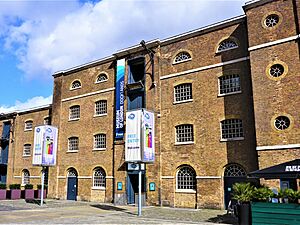London Museum Docklands facts for kids
 |
|
| Lua error in Module:Location_map at line 420: attempt to index field 'wikibase' (a nil value). | |
| Former name | Museum in Docklands; Museum of London Docklands |
|---|---|
| Established | 2003 |
| Location |
|
| Visitors | 324,438 (2019) |
| Public transit access | West India Quay |
The London Museum Docklands is a cool place in West India Quay, London. It tells the amazing story of the River Thames and how the Port of London grew. You can also learn about the docks' historical connection to the Atlantic slave trade. This museum is part of the bigger Museum of London family. It gets its funding from the City of London Corporation and the Greater London Authority.
The museum first opened its doors in 2003. It's located inside old sugar warehouses built in 1802. These buildings are very special, listed as grade I listed for their history. They are a short walk from Canary Wharf.
Contents
Exploring the Museum's Collections
The museum has many interesting items from the past. A lot of its collection comes from the Port of London Authority. These items were moved to the Museum of London in the 1970s. Then, they were stored away until the Docklands museum opened.
The museum has 12 main galleries and a special children's area called Mudlarks. You can watch videos and see old objects, models, and pictures. Visitors usually go through the displays in order. This helps you follow the story of the Thames. The story starts from Roman times when the first port was built. It goes all the way to the 1970s when the central London docks closed. You'll also see how the area changed with new buildings.
Special Exhibitions and Displays
The museum often has new and exciting exhibitions. In 2007, it opened a big exhibition called London, Sugar, Slavery. This marked 200 years since the Slave Trade Act 1807. This act made British involvement in the Atlantic slave trade illegal. The exhibition helped people understand this important part of history.
In March 2016, the museum opened an exhibit about the building itself. The building was known as No. 1 Warehouse. It was built in 1802 when the West India Docks were expanding. Later that year, the museum showed Dick Moore's George Cross medal. This medal was given for his bravery during the London Blitz.
In 2017, the museum displayed old items found during the Crossrail project. These were exciting archaeological discoveries. From September 2020 to April 2021, the museum showed the Havering hoard. This was a collection of ancient treasures.
Getting to the Museum
It's easy to get to the London Museum Docklands using public transport.
- Docklands Light Railway (DLR): The closest station is West India Quay. It's only a 5-minute walk away.
- London Underground: You can go to Canary Wharf station. It's about a 10-15 minute walk from there.
- London Buses: Several bus routes stop near Westferry station. These include routes 135, 277, D3, and D7.
- London River Services: You can even arrive by boat! Canary Wharf Pier is about a 12-minute walk away.
See also
- London Docklands
- Museum of London
- Museum of London Archaeology
- Island History Trust
- Culture of London
- Robert Milligan (merchant)
- Statue of Robert Milligan, which stood outside the museum until 2020
 | Kyle Baker |
 | Joseph Yoakum |
 | Laura Wheeler Waring |
 | Henry Ossawa Tanner |

